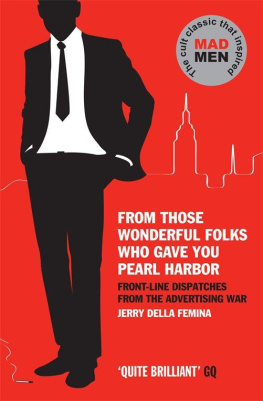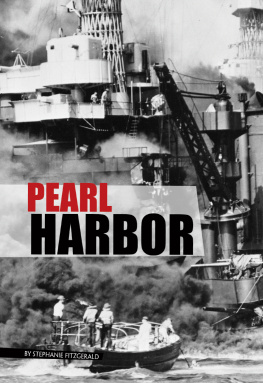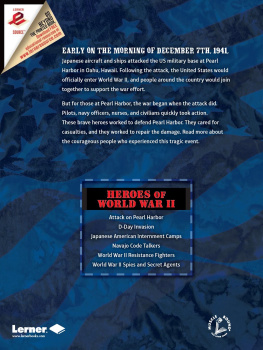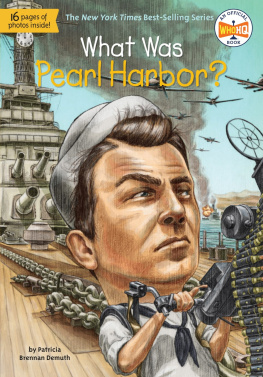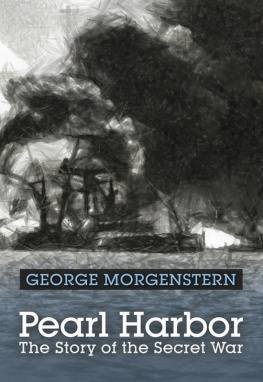
The first day they had a meeting on the Japanese electronics company, Panasonic, and there must have been six or seven guys there: the account supervisor, the account executive, the executive art director, and a couple of others. I figured Id keep my mouth shut for a few minutes, like it was my first morning in the place.
One guy said, Well, what are we going to do about Panasonic? And everybody sat around, frowning and thinking about Panasonic.
Finally, I decided, what the hell, Ill throw a line to loosen them up I mean, they were paying me $50,000 a year plus a $5,000-a-year expense account, and I thought they deserved something for all this bread. So I said, Hey, Ive got it, Ive got it. Everybody jumped. Then I got very dramatic, really setting them up.
I see a headline, yes, I see this headline.
What is it? they yelled.
I see it all now, I said, I see an entire campaign built around this headline. They all were looking at me now. The headline is, the headline is: From Those Wonderful Folks Who Gave You Pearl Harbor.
Complete silence. Dead silence
This book is dedicated to the dedicated: Ally, Bernbach, Burnett, Calet, Case, Dunst, Durfee, Frankfurt, Gage, Goldschmidt, Harper, Hirsch, Karsch, Kurnit, Lois, McCabe, Moss, Paccione, Raboy, Rosenfeld, Travisano, Wells and all the others.
The advertising business is, if nothing else, highly volatile. Factual references, billings, account affiliations at agencies and other similar details are accurate, to the best of our knowledge, as of October 1, 1969. Undoubtedly, accounts will move and billings will change between the time this book goes into production and publication day. If there are any such errors, the author and editor regret them. One final note: To protect the innocent and guilty alike, a few pseudonyms have been used in the book, but 9944/100 per cent of the names, agencies and situations described are real.
The original Mad Men are all dead. Ironically, they died from consuming the products they sold with such gusto. Their lungs went from the cigarettes they advertised and smoked by the carton. Their livers melted from all the scotch, gin and vodka they made famous and the three-martini lunches they enjoyed in the process
T he original Mad Men are all dead.
Ironically, they died from consuming the products they sold with such gusto. Their lungs went from the cigarettes they advertised and smoked by the carton. Their livers melted from all the scotch, gin and vodka they made famous and the three-martini lunches they enjoyed in the process.
I wrote From Those Wonderful Folks Who Brought You Pearl Harbor in 1970. What you are about to read is a candid, inside look at a wild period in business, a new era of Mad Men that we will never again see.
I came into the advertising business in 1952 at the age of sixteen, as a delivery boy for a stuffy, old-line advertising agency named Ruthrauff & Ryan, which could have served as the setting for the Mad Men television series without moving a desk. Needless to say, it was a difficult business to break into, especially for a teenager with a limited education.
In 1956, I took my portfolio of sample creative work to J. Walter Thompson, the worlds largest advertising agency. They had a position open for a junior writer of sales promotion on the Ford Truck account. At that time Ford was J. Walter Thompsons largest account.
The copy chief on the account looked at my work and said, This is very good, but I cant suggest you for the job.
Why? I asked.
His answer was delivered with a nervous smile. Because this is Ford and they dont want your kind working on their business.
It took me years to figure out what your kind meant.
Advertising agencies in those days were broken down among ethnic lines. The Mad Men flourished in large Protestant ad agencies like J. Walter Thompson and N. W. Ayer, BBDO and Ted Bates. These agencies monopolized all the large advertising accounts (cars, food, cigarettes, soft drinks, beer). The other, smaller accounts (dress manufacturers, shoes, underwear, small retail stores) were regulated to tiny, Jewish ad agencies. By 1950 only one agency whose founders were Jewish had managed to win packaged goods, cigarette, liquor and car accounts. They did so by naming their agency after the color of the walls in their office, and by not using their Jewish names on their masthead thus Grey Advertising was born.
Then, in the mid-1950s, a Jewish advertising agency broke through the ethnic barrier. Doyle Dane Bernbachs campaign for advertisers like Volkswagen (Think Small, Lemon) and Levys Bread (You dont have to be Jewish to love Levys) changed the advertising business. Doyle Dane Bernbach made distinctive advertising that had attitude and respected the consumers intelligence. They sold products with ads that had humor, bold language and layouts with sharp, clean and stylish design. It opened the door for a totally new kind of Mad Man.
By 1961, when I got my first copywriting job, my kind were suddenly in demand. The creative revolution had begun. Advertising had turned into a business dominated by young, funny, Jewish copywriters and tough, sometimes violent, Greek and Italian art directors.
The original Mad Men did not give up without a fight.
I once attended an advertising conference held at the Greenbrier Hotel in 1968. The dean of the original Mad Men, the great David Ogilvy, was the keynote speaker. The subject of his speech was the new creative revolution in advertising. Ogilvy knew his audience was mostly made up of desperate men who were trapped in agencies that were losing accounts to young, upstart, ethnic agencies. Ogilvy lashed out and declared, I say the lunatics have taken over the asylum!
The audience rose and gave that fighting line a standing ovation. I stood up and was clapping as loudly as the next man when I suddenly thought to myself, What are you clapping about hes talking about you.
It was a wonderful asylum. We were wild. We made the antics depicted on every episode of Mad Men look like Rebecca of Sunnybrook Farm . Our little agency was permanently filled with the sweet smell of burning cannabis. Life was easy was back in the days before human resource departments controlled business and someone decided we all should be politically correct. Everyone smoked (I had a four-pack-a-day habit). Everyone drank martinis (I had many a three-martini lunch), and everyone screwed around.
In the business world of the 1950s and early 60s, sex was a forbidden subject everyone did it and no one talked about it. But by 1965 the sexual revolution was on, and the advertising business went wild. I encouraged it at my agency because nothing got creative people to come in early and leave late better than the prospect of sexual adventure.
In 1967, when I opened my ad agency, Jerry Della Femina & Partners, a group of us started an Agency Sex Contest. For more than twenty-five years, one week at the end of every year was devoted to Animal House -like antics. This was, until today, the best-kept secret in advertising. Thousands of people took part in the Agency Sex Contest.
The contest had everyone in the agency voting anonymously on paper ballots for the three people they most wanted to go to bed with. They were also asked to vote on the person of the same sex they would consider going to bed with. And, of course, there was the mnage a trois category, in which they selected the two other people they wanted to go to bed with. Sometimes as many as 300 votes were cast.

